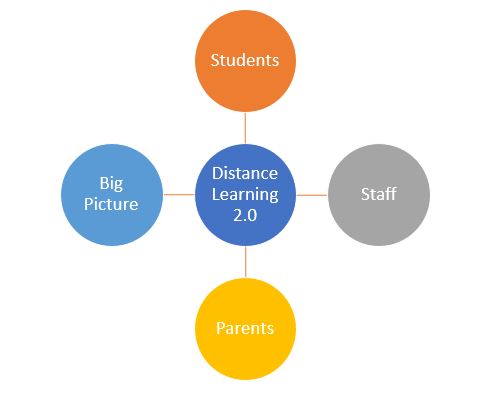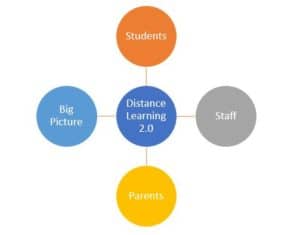
How we have conducted digital learning has changed significantly.
Within these past several months, it’s been a whirlwind where one could lose their mind quickly.
From being Zoomed out to inundating professional developments, people have realized that distance learning is more complicated than it appears.
Thank goodness Summer is finally here – and it’s a chance to reflect and adjust.
Lessons were learned, and significant adjustments were made to have the digital divide closed to keep students engaged.
But there’s still much work to do.
Before I begin with the 4 Ways to Upgrade Digital Learning, I want to thank the educators, parents, and business leaders who rose to the challenge.
What you did made a difference!
Even though we will not know what the future holds regarding teaching online or in person, ensure that everyone is ready before Day 1.
Upgrading Digital Learning for teachers should be broken down into four areas:
Students Come First!
We have to remember that students must come first. They are our future, and our responsibility is to give them our best.
From what I’ve seen, read, and heard, clear and consistent communication between teachers and students remains the top priority.
Here are just a few ways to improve this area.
· Utilize Google Calendar and other reminders by having them alert students to essential tasks. For those students who don’t like to use Google or don’t know how to send students a calendar with dates and times.
· Communicate with the group with personal and group emails inside and outside the platform. Spell out details with easy-to-read tables and eye-appealing documents.
· Take photos to show more details, which gives students a clear picture of the expectations.
· Use extra measures to let students know you are there for them.
Supporting teachers and each other.
We, as educators, can often feel alone when using distance learning. Even though we can call or email someone, nothing will ever replace personal interaction with a good friend.
For teaching our children, there are ways we can support one another when distance learning comes into focus.
· Provide a good list of resources that include favorites and newbies! Share what you know works, and don’t reinvent the wheel.
· Ask to shift the information in department and content meetings from traditional operations to a digital focus. For example, look at places where you or your department may struggle when conducting an online lesson.
· Make it a priority to build relationships in your classes and network. Kids won’t care about what you know until they know you care!
· Access after-school hours for extra tutoring or general question and answers. An additional 15 minutes with a student could ease their built-up anxiety from uncertainty.
Parents need to feel the love too.
Parents have also struggled during COVID19. Between their jobs and balancing their children’s education, they have a fine line to walk.
Here are some tips to assist them.
· Send parents things upcoming items for the week. For example, if you are conducting a lab, send a list of materials, so their children have everything within reach for the lesson to start.
· Acknowledge that it’s hard for them too. As a parent of three children, it has been hard juggling both.
· Flex times and assignments, especially when there are limited resources. If you are a parent, share with the teachers your situation.
Looking at it from the big picture.
Sometimes, we need to look at digital learning through a different lens. That’s when we should review grades, completion percentages, times assignments are submitted, and time on the platform to see where most of our classes are struggling.
Consider these factors when looking at the big picture.
· Create a Master List of your classes and identify key data points you want to measure. Update it weekly to predict patterns and recognize areas of concern. I’m confident your school district’s platform has data you can access.
· Identify student weaknesses in the curriculum and technology. Students may be a whiz in your class but may struggle using a laptop. Should that be the case, build supports like a tip sheet or YouTube video.
· Establish safeguards in place. For example, if teaching a class with Zoom and a student doesn’t understand a part of the lesson, they can send a message to you without everyone knowing, saving possible embarrassment.
· Pump out good news every day. Keep hopes alive, and inspire your class by sharing things they can resonate with during the lesson.
· Redesign your lesson plan. Traditional lesson plans are not 100% effective in distance learning. We must recognize critical areas within the lesson to revamp that will bring more engagement and feedback.
· Integrate College and Job Awareness. Since students are accessing lessons on the computer, why not extend the experience to include college and jobs that align correctly with a lesson?
These simple tips will not only build up frustration but will bridge those gaps into fruitful dialogue and trust, which will turn into a positive experience for all.
Do you need assistance in setting up distance learning?
If you do, rest in knowing you’re not alone.
Contact me where I can hear your ideas and build a positive and robust plan.
[wp-faq-schema title=”What are some factors to consider when it comes to Digital Learning?” accordion=1]
[wp-faq-schema title=”What are some other things to consider when it comes to Digital Learning?” accordion=1]




